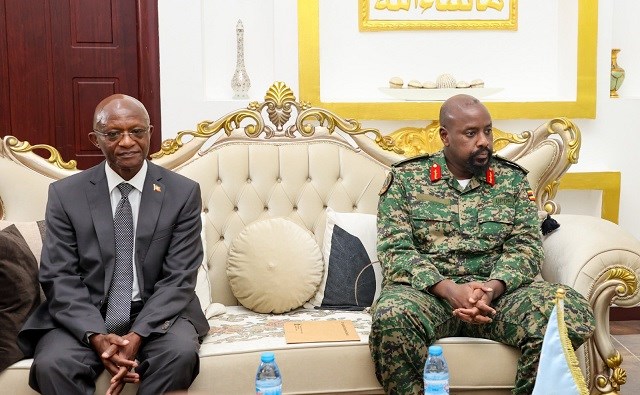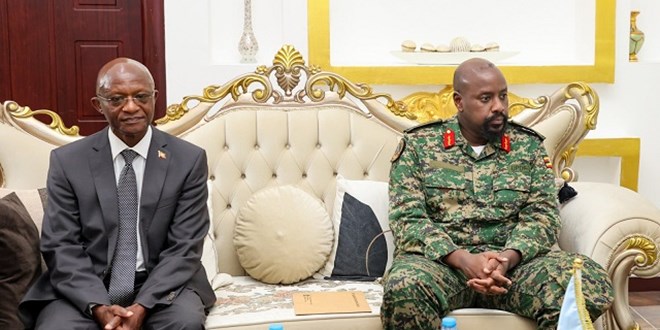[ad_1]

Monday December 11, 2023

Gen. Muhoozi Kainerugaba (R)
Kampala, Uganda | IAN KATUSIIME | America’s visa ping pong with Uganda goes on. Once again, the U.S. has issued visa bans on top Ugandan officials to continue a trend that has played out for four years.
U.S. Secretary of State Anthony Blinken made the announcement on Dec. 04 in the latest episode of the diplomatic strangulation Washington is meting out on Ugandan officials.
Blinken said the ban was an “expansion of the visa restriction policy to include current or former Ugandan officials or others who are believed to be responsible for, or complicit in, undermining the democratic process in Uganda or for policies or actions aimed at repressing members of marginalised or vulnerable populations.”
America’s top diplomat said the marginalised or vulnerable populations include environmental activists, human rights defenders, journalists, LGBTQI+ persons, and civil society organizers. He added that the sanctions may have extra bite: “The immediate family members of such persons may also be subject to these restrictions.”
Eron Kiiza, a renowned human rights lawyer, who has represented several victims of torture and state abuse welcomes the sanctions.
“Most of these powerful people accumulate wealth and invest it in countries which are flourishing democracies.” he told The Independent. “It’s the only counterweight to these people.”
Kiiza added that many times the victims of the powerful in Uganda do not have a way of getting justice since the human rights abusers are protected by the Ugandan system.
Kiiza said the U.S. should have named the culprits as a deterrent measure.
“There has been a change of strategy…we would have wanted to know so that we tell others who may want to follow suit.”
In a Twitter Space hosted by journalist and activist Agather Atuhaire on Dec. 06 ahead of International Human Rights Day, US Ambassador William Popp said he could not comment on specific individuals or circumstances but clarified that the visa restrictions target anyone who is involved in human rights violations.
“The actions are a well-established element of U.S. law to prevent human rights violators from going to the U.S. and in some cases taking part in the U.S. financial system,” Ambassador Popp said. “It is intended to prevent such individuals from having those privileges.”
Previously, the U.S. has sanctioned top Ugandan military officers including Gen. Kale Kayihura, former Inspector General of Police (IGP) who was pinned in 2019 for his role in the torture of opposition politicians. Kayihura was a close Museveni ally who helped entrench Museveni’s rule through dismantling of opposition rallies and co-opting of youth who were key in staging protests. Kayihura’s wife and two children were also hit by the sanctions.
Maj. Gen. Abel Kandiho, ex-Chief of Military Intelligence, was sanctioned in December 2021. He was widely implicated in the kidnap and torture of opposition supporters during the 2021 presidential elections. He is currently Joint Chief of Staff in the Uganda Police Force in what is perceived to be a low hanging fruit in the security establishment.
In April 2021, civilians in the Ugandan government went into panic mode when the U.S. announced visa restrictions although like in the latest announcements, no names were mentioned.
Sam Kutesa, former minister of foreign affairs, was not sanctioned formally but is believed to be persona non grata in the U.S. In 2021, Museveni dropped him from cabinet following his diplomatic troubles after a long stay in the position. A few years before, Kutesa was named in a U.S. federal indictment owing to his time as President of the U.N. General Assembly in 2014/2015.
The revelation by Blinken that immediate family members of those targeted may also be entrapped certainly spells bad news for the next of kin of Uganda’s head honchos who may not be involved in the ongoing political machinations. It also means that the number of Ugandans on the Specially Designated Nationals (SDN) list in the US Treasury Office of Foreign Assets Control (OFAC) will only grow longer.
The Kakwenza case effect
Although U.S. sanctions have previously targeted high ranking military figures in Uganda for their roles in acts of torture, forced disappearances, illegal arrests, and detention, Gen. Muhoozi Kainerugaba, President Yoweri Museveni’s son, a high profile political and military figure with presidential ambitions, has not been listed.
But as Blinken hinted, the scope of the dragnet could be widening. Members of Parliament, for example, are most likely targeted for their role in passing of the Anti-Homosexuality Act earlier this year. In a parliament session a day after the U.S. travel ban was announced, the Speaker of Parliament Anita Among and MPs scoffed at the ban saying they are proud of the legislation.
The U.S. immediately blocked Speaker Anita Among from travelling to the U.S. immediately after the law was passed. It is unlikely that the travel ban will apply to all the 529 MPs since the law was passed by all legislators except one but key movers and MPs vehemently opposed to homosexuality could be denied the coveted U.S. visa.
Kizza said he did not want to speculate on who could be on the list this time but when asked about the case of Kakwenza Rukirabashaija, he had a wish: “If any person who harassed Kakwenza is there, I would be happy. It would be the necessary repercussion.”
Kakwenza’s profile grew after he was granted asylum in Germany in 2022 weeks after his torture ordeal. Armed with his Twitter account and novels, he became a poster boy for the victims of torture chambers in Uganda.
Among cases Kizza has pursued is that of Kakwenza, a satirical novelist who fled into exile to Germany after alleging that he had been tortured in an ungazetted detention in Uganda.
Kakwenza alleged he was tortured by state agents allegedly on the orders of Muhoozi. This was after Kakwenza posted tweets attacking Muhoozi. The torture of Kakwenza sparked a lot of condemnation towards Muhoozi as images of the grievous bodily harm on Kakwenza circulated on social media.
For Kakwenza, there has been no sitting back. In the over two years he has been in exile, he has sustained a campaign against Muhoozi– releasing a new book titled The Savage Avenger– that narrates his arrest, torture and how he fled to exile. On the cover of the book is a cartoonish depiction of Muhoozi with torture tools.
The torture accusations cast Muhoozi in the international spotlight just a year after Uganda emerged from a most violent election. Kakwenza’s case is among the thousands of others that include forced disappearances, kidnaps, abductions reported in Uganda that could have spurred the latest U.S. visa restrictions on Ugandan government officials.
Muhoozi’s profile also blossomed nationally as he held political rallies canvassing for support for a 2026 presidential run. But as debate has raged on who the latest visa ban could be targeting, whispers zeroed on Muhoozi who has had a relatively quiet year after toning down on his tweets and political activity.
During his brief time as UPDF Commander of Land Forces, Muhoozi was arguably the best well known army chief on the continent through his kinetic Twitter account. He was a bull in a china shop and would even get rebuke from his Commander-in Chief who is also his father. This behavior coincided with the coup wave where African soldiers have been toppling their Commanders-in-Chief in quite dramatic fashion.
After a notorious tweet about invading Kenya in October 2022, President Museveni removed his son from the post after fourteen months of flouting nearly every code of conduct in the UPDF.
It is this online activism that could land Muhoozi in trouble since Ugandan opposition actors, journalists, gay and human rights activists have used their social media platforms to drum up support for their causes.
Gen. Muhoozi shuns U.S.
Muhoozi last set foot in the U.S. in 2015 when he visited a U.S. military training school. At the time, he was Head of the Special Forces Command (SFC) and in early 2017 he was dropped from the post. However a review of Muhoozi’s most recent travel history indicates that he may be under a U.S. visa ban.
During his tumultuous reign as UPDF Commander of Land Forces, Muhoozi did not attend the Africa Land Forces Summit, a U.S. organised forum for land forces in Africa. In 2022, it was hosted in the U.S. and this year, it was in Ivory Coast.
Although the summit is a low-key event that does not receive almost any media attention, it is usually a jamboree for elite African army officers who have established rapport with U.S. Forces under the auspices of the U.S. Africa Command (AFRICOM). The outfit was formed in 2007 to enhance military ties between the U.S. and African nations through joint counterterrorism drills, trainings and building a shared understanding of security.
But there were signs that the U.S. wanted to keep an arm’s length from the troublesome General. In May 2022, then commander U.S. AFRICOM, Gen. Stephen Townsend, had a nine-day tour in the East and Horn of Africa where he skipped Uganda.
The omission was as revealing as it could get. Rather than meet the Chief of Defence Forces, Gen. Wilson Mbadi, while keeping Gen. Muhoozi out of the loop, Townsend avoided the country altogether and averted what would have been an awkward situation for the military and U.S.-Uganda relations by extension.
The U.S. General ended his tour in Rwanda where he met with one of Muhoozi’s favourite people; President Paul Kagame. A US AFRICOM spokesperson ducked the question on the omission while responding to The Independent but he gave credit to Uganda’s role in regional peace and security. His Ugandan counterpart Brig. Felix Kulayigye downplayed the matter while also lauding Uganda’s role but for keen watchers of the developments, it was interpreted as quiet disapproval of Muhoozi.
But if the snub by Gen. Townsend to Muhoozi was an unknown quantity, Muhoozi’s inability to travel to the U.S. during the highly billed U.S. Africa Leaders Summit in December 2022 offered a glimpse into where the Ugandan General stood with the country. President Museveni was invited to the summit and while there, it was an opportunity for much needed optics with the rope of sanctions hanging around the necks of his government officials.
The summits are an interesting prism for these relations because when it came to the Russia Africa summit held this year, Museveni and Muhoozi looked like the perfect duo although most African leaders stayed away.
For Muhoozi, it granted him the chance to meet one of his idols; Russian President Vladmir Putin whose admiration he has put on display since he dispatched tanks into Ukraine early last year.
Museveni had been iced for a democracy summit hosted by US President Joe Biden in December 2021. Museveni travelled with his daughter Natasha Karugire for the 2022 Summit and left behind Muhoozi who was now cooling off after being dropped from the army’s number three position.
There was intense lobbying by Ugandans based in the U.S. and by officials in the U.S. government to have the White House decline an invitation for the long serving Ugandan leader due to the human rights violations such as illegal arrests, kidnap and torture before and after the 2021 presidential election.
Now that election is back to haunt those that oversaw it. The visa ban may have Muhoozi in its target because Museveni brought back Muhoozi from the cold just a month to the election when he re-appointed him Commander SFC.
That move was instructive because while at a press briefing a month after the Jan. 14 presidential election, Museveni said that some of the commandos deployed to counter security threats during the elections were flown in from Somalia where Uganda has troops fighting Al Shabaab.
[ad_2]
